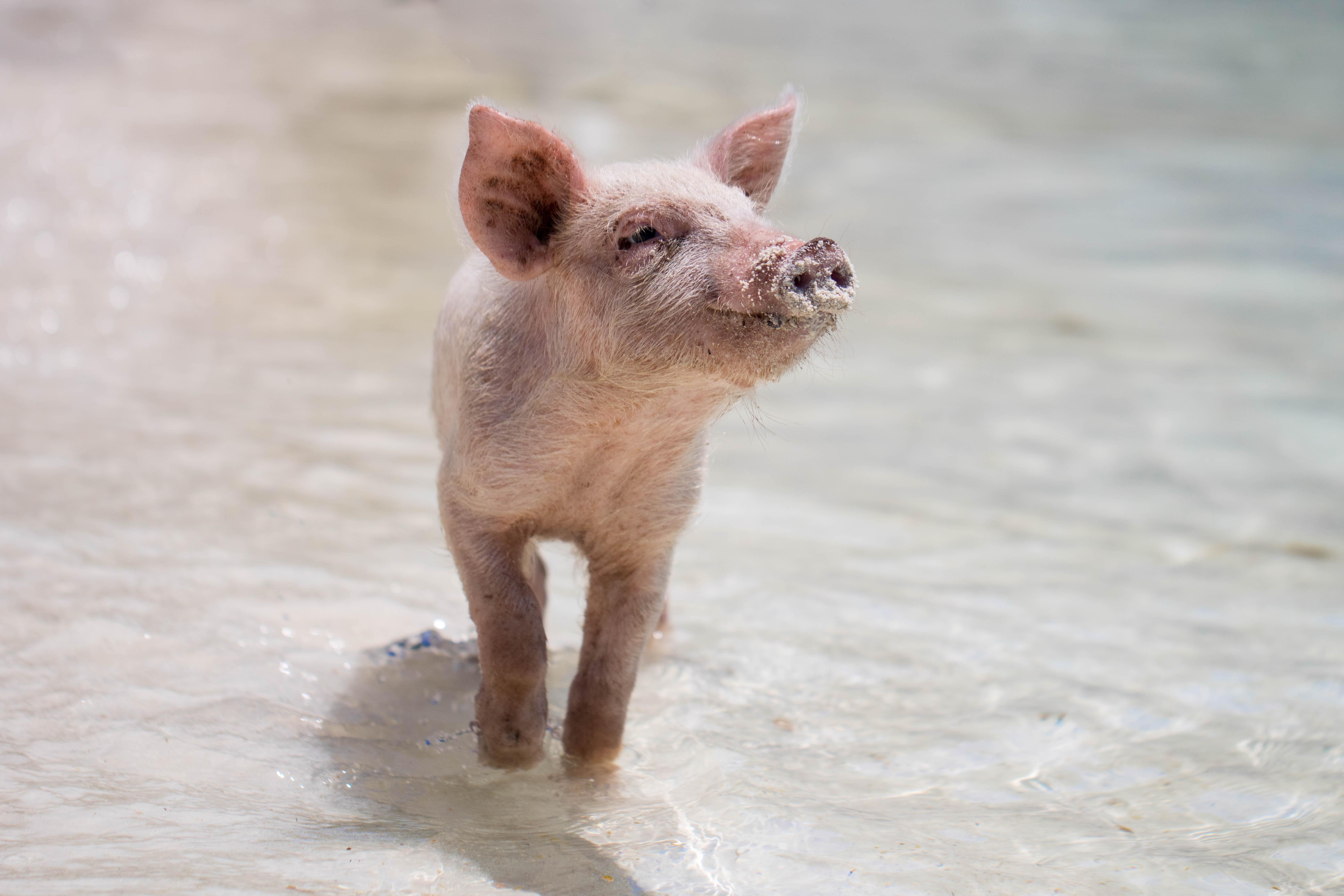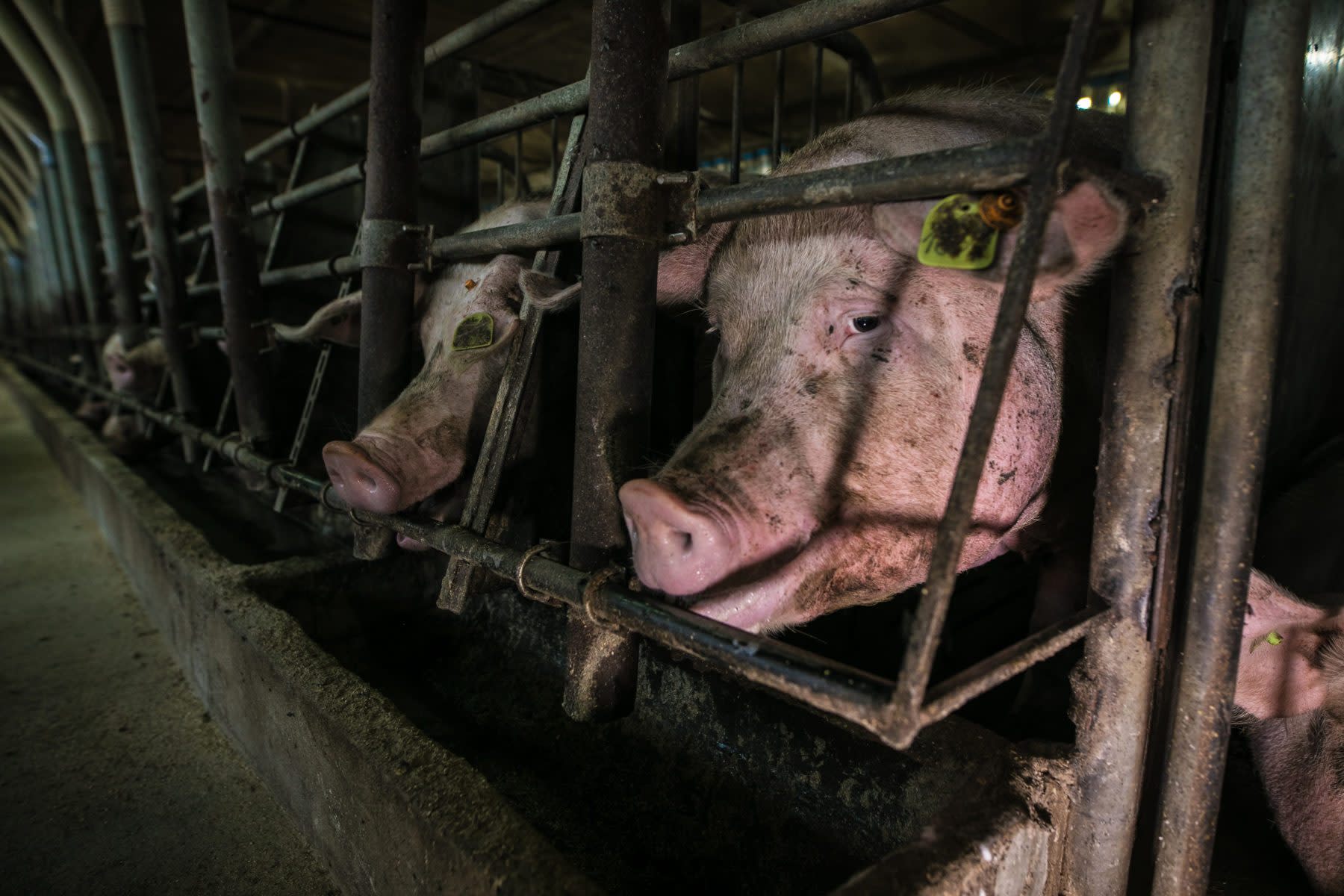




We all know the stereotype of pigs rolling around in mud. But how clean actually are these animals? Read on to find out about the wild world of pig hygiene—and 14 other cool facts!

Pigs have gotten a less-than-clean reputation. When we’re kids, our parents tell us that our room looks like a “pig-sty” and the dominant image of pigs is of animals happily rolling around in mud. But there’s more to pigs than meets the eye—not least their bathing habits! Let’s dive into the weird and wild world of the pig… it’s a cleaner space than you think.
Are Pigs Clean?
Yes! Don't listen to the fake news: pigs in their natural state are one of the cleanest animals in the world. They practice important hygiene habits like keeping their toilets far away from their eating and living spaces (when they have the choice). And they've even been known to beautify their living space, decorating it with flowers!
Are Pigs The Cleanest Animal?
There's not a definitive ranked list of the cleanest animals in the world and lots of animals practice different ways of keeping themselves clean. For example, think of your pet cat giving himself a delicate bath every day—or songbirds, who keep their nests obsessively clean to stop predators from detecting the location of their chicks. But pigs are definitely one of the cleanest animals out there!
The fact that they know to keep their living and defecating areas separate also shows a high level of intelligence. Pigs don't simply want to be clean; they know that being clean will keep them healthy.
Why Are Pigs Considered Unclean?
The main source of the unclean pig myth is the fact that pigs like to cover themselves in mud. But there's actually a very clever reason why pigs do this: it's because pigs, like humans, can get sunburnt! Rolling around in mud offers protection for their skin from the harsh rays of the sun, and it makes it harder for insects to bite them.
Mud also helps pigs regulate their temperatures. Pigs don't sweat much, so covering themselves in mud can help them cool off on a hot day. Researchers have found that pigs in cool temperatures under covered conditions don't tend to cover themselves in mud at all.

Sadly, though, millions of pigs don't get to spend time outside or express any of their natural behaviors—including their natural cleanliness. That's because a vast majority of pigs in the US live on controlled animal feeding operations, otherwise known as factory farms. These facilities pack thousand of pigs in one indoor warehouse space, barely giving them enough room to move. And, during their pregnancies, they confine female pigs even more intensively in tight metal crates known as gestation crates. The overcrowded environment leads to unmanageable filth and manure buildup, leaving pigs to suffer through immense physical and psychological stress.
Research and observation has shown us time and time again that pigs are gentle, intelligent, and friendly animals—not unlike the dogs and cats we share are homes with. Read on to learn more about this incredible species, and how their personalities can shine outside the confines of a factory farm.
14 Interesting And Fun Facts About Pigs

Pigs Are Highly Intelligent
Pigs are one of the smartest animals out there: in fact, they're considered the fifth most intelligent animal in the world! They show intelligent and complex personalities in a number of ways, including cognition, communication, memory, problem solving and even using tools in the wild to build their nests. Scientists have found that pigs have around the same intelligence as a three-year-old child, and they're smarter than most dogs. They can even play video games!
Along with this, pigs also show a lot of emotional intelligence. They display empathy in the way they mirror one another's moods and they can distinguish between work and play (in fact, pigs are super playful with one another). And of course, this also means that pigs suffer from complex negative emotions including grief, sadness, anxiety, isolation and pain, particularly when they're swept up in the cruelty of the factory farming system. An animal's intelligence shouldn't really matter in terms of how we treat them—going through pain is miserable no matter how smart you are!—but it certainly means that pigs can comprehend and despair at the cruelty factory farming subjects them to.
Pigs Have Excellent Memories
Pigs remember and retain information for many years! Multiple studies have showcased pigs' amazing memories and there have been all kinds of fascinating experiments that offer pigs the chance to show off their memory. For example, one team of scientists tested generational memory and learning amongst pigs by getting piglets to watch their mothers complete a task in order to find some food. The piglets all performed extremely well in manipulating their surroundings the same way the older pig had to get the food—and they could perform the task even better the next day, and then again six months later!
"Apparently, they memorized what they observed and could correctly reproduce it when needed," the scientists said.
No Barnyard Animal Has A Better Sense Of Smell
Another reason pigs are so clean? They have a much better sense of smell than you, with up to 2000 times better smell than a human! Pigs have a highly advanced sense of smell): they can detect odors coming from miles away, or deep underground. In the wild, this helps them detect food and stay away from predators. In captivity, this means that some law enforcement agencies are trialing using pigs to sniff out drugs!

The Pig Is The Friendliest Animal
If you're looking for an animal pal, you can't go wrong with a pig. Pigs are some of the friendliest animals in the world, and they're particularly popular in a barnyard, where they're always up for a cheerful welcome and a scratch behind the ears. They form close bonds with other animals (not just other pigs!) and can be seen lying down for a cuddle with all kinds of animals, and because of their playful natures, they're always up for a game. Plus, don't forget about their great memories: pigs recognize the humans they see all the time, and are more likely to be affectionate with humans they know than strangers. Pigs love physical touch: they've even been known to climb into their humans' laps!
Pigs Are Social
As you've probably guessed by now, pigs are extremely social creatures, both within groups of other pigs and with other animals. They can distinguish individual animals out of a group, pick up on verbal and nonverbal cues from humans, and communicate through touch, smell, sound, and sight. Once again, that highly developed sense of smell is all-important; scientists have found that pigs can form social ranks even when they're blindfolded, using only smell and vocal cues.
Under free-ranging conditions, pigs live in groups of eight, usually with three sows and their kids: so pigs grow up in a family with their mom, cousins and aunties!
Pigs Are Very Peaceful Animals
Pigs don't like to fight. It's very rare to see aggression amongst pigs, and when it does occur—for example when there's a scuffle over a piece of food, or the best place in the shade—scientists have observed that a third pig will often step in to break up the fight! After they fight, the same study found that pigs will make up: once they've calmed down, both the victim and the aggressor of the fight lie down together and rub their noses until they're friends again.
Part of the reason pigs are so peaceful with each other and other animals is that they have a very stable hierarchy from very early on. Within hours of birth, piglets begin to form social dominance relationships with their littermates. And when they play with one another as piglets, they develop the skills they need for conflict resolution and recognizing one another.
They Are Much More Tolerant Of Colder Temperatures Than Heat
Even though pigs don't have fur or feathers, they can still stand pretty cold temperatures thanks to a thick layer of fat as insulation. In fact, pigs are more likely to swoon in the heat than freeze in the cold, and it's important to make sure pigs don't overheat on hot days. But that doesn't mean that you don't ever have to worry about pigs in cold weather, because of course when things get really nippy pigs need extra warmth and protection from the elements. In fact, piglets will even shiver in the cold, just like us.

Pigs Don’t Sweat
Sweating like a pig? You're not sweating at all, because pigs don't sweat much! Although pigs have similar "skin" to us humans, unlike us, they don't use sweating as a way to thermoregulate like we do. Contrary to popular belief, pigs do have sweat glands, just not many, especially not proportionate to their size, so sweating isn't an effective way for them to cool themselves down. Instead, pigs use cool mud and water to keep from overheating on hot days.
(Fun, non-pig fact: "sweating like a pig" actually refers to iron smelting. When hot iron is poured on sand, it cools and solidifies to resemble a sow and piglets, and is sometimes called "pig iron". When the iron is cool enough to touch, the surrounding air forms dew on the metal, indicating that you can handle it safely—hence, "sweating like a pig"!)
Pigs Use Grunts To Communicate With Each Other
Pigs are extremely vocal, and they have their own language. Researchers have found that pigs have at least 20 distinct grunts (or oinks) to express a range of emotions, including excitement, welcome, sadness, anger and more.
"It's possible... to figure out the emotions of the pigs according to their vocalizations," one researcher explained. Pigs use these grunts not just to talk to one another but also to talk to the humans around them. For example, calm grunts might indicate that they want your attention, while loud grunts could be a sign of excitement or even a warning.
Newborn Piglets Learn To Respond To Their Mothers’ Voices
Would you recognize your mom's voice anywhere? So would pigs! Since the 1980s, scientists have figured out that newborn piglets have already begun to know their mother's voice from one day old. And they soon learn to come when they're called, especially when it's time to eat: newborn piglets run toward their mother's voices. They love to talk back to their mothers, too; scientists have seen piglets running to their mother's snout after feeding, to rub their snouts together and grunt. Thanks, Mom!
Mother Pigs Sing To Their Babies
Did you know that pigs have their own lullabies? There's dozens of examples you can watch online of mother pigs singing to their babies, either during feeding or to let them know it's time to eat. It's another way that pigs communicate comfort, affection and love to one another, solidifying those strong social relationships.
Pigs Love Belly Rubs!
Bodily comfort is important to pigs, and they like touch. (They're much cuddlier than other beloved pets, like some of the more standoffish cats!) It's not uncommon for a pig to seek you out for a scratch on the forehead or, their favorite, a belly rub. Pigs who are particularly fond of belly rubs will even roll over to show you a rub would be appreciated! In case you don't have a pig to hand, there's plenty of cute compilations online of pigs getting the belly rub of their dreams.

Pigs Dream And Like To Sleep Nose-to-nose
We've already learned that pigs have a highly developed sense of smell and that it's one of the most important ways pigs communicate. A pig's snout is also very important on a tactile level; the highest density of a pig's tactile receptors is found in her snout, and they also use snout touching to resolve conflict or offer comfort. That's why they also love to sleep snuggling together with their noses touching. Scientists have found that pigs get a boost in oxytocin ( the 'love hormone') after cuddling! While they're cuddling in their sleep, pigs are also dreaming. Pigs go through the same phase of REM sleep that humans do, and scientists believe that, just like us, pigs dream during the REM cycle.
Pigs Have An Excellent Sense Of Direction
Aided by their amazing memories and prodigious sense of smell, pigs have a great sense of direction. Wild pigs like boar and warthogs can detect north and south, and scientists have said that it's likely domestic pigs have the same magnetic senses. Certainly, pigs can find their way home over extremely long distances... and they'll do so pretty quickly, too, moving at up to 17 kilometers an hour!
Pigs Suffer Immensely On Factory Farms
With their happy social groups, playful behavior, and sharp intelligence, pigs are set up by the natural world for a good life. But human intervention and exploitation sees millions of pigs suffering every year under the cruel treatment of factory farms.

Raising pigs for profit, factory farms abuse pigs in a number of horrific ways. Mother pigs are unable to look after their piglets the way they want due to the painful and distressing farrowing crate process. Piglets are taken away from their mothers at just three weeks of age, vs the 10-17 weeks a mother pig will naturally nurse her children. Male piglets are castrated shortly after birth and many pigs have their tails docked, usually without any pain relief. Slaughterhouses kill pigs in extreme and horrific ways, and often don't properly stun animals beforehand—meaning pigs are fully awake and conscious when killed. And of course, factory farms kill pigs in an untimely and cruel manner, usually when they're only six months old. In the wild, pigs live happy lives of up to twenty years.
The cruelty of these processes seems all the more vivid when we know that pigs sing to each other, that they play and comfort one another, that they're the friendliest animals in the farmyard. Take action now to save pigs (and all their barnyard friends)!






